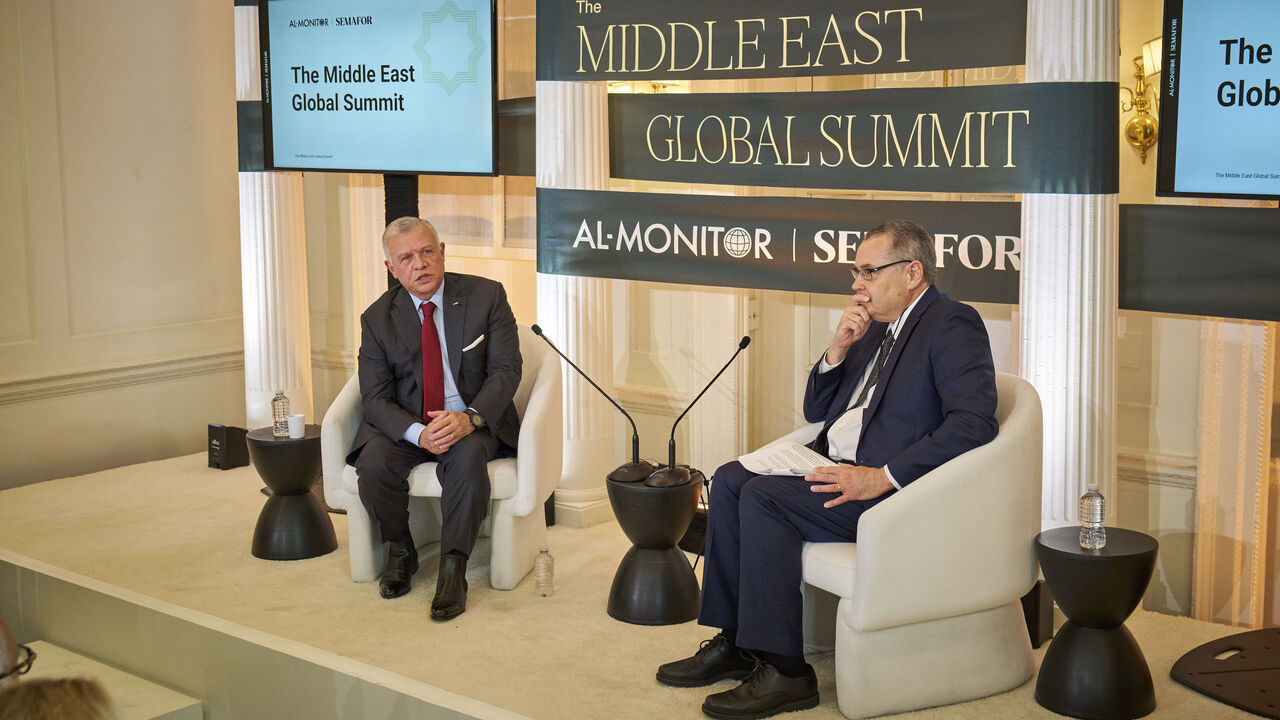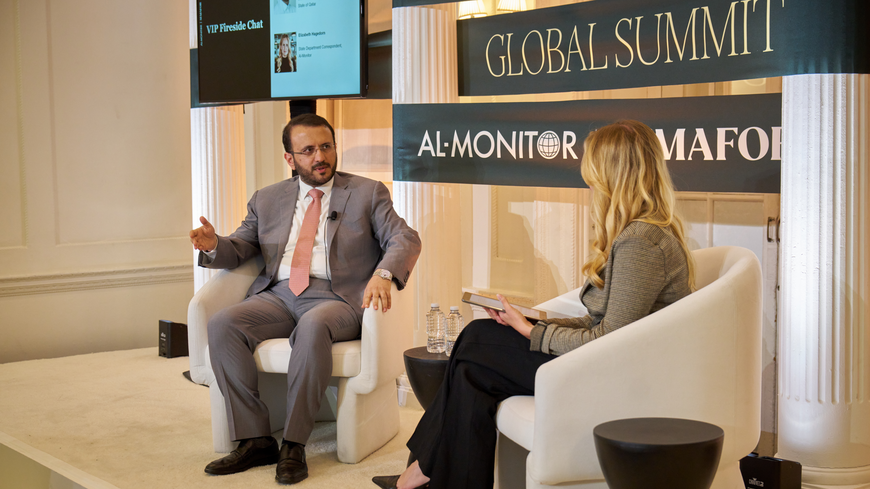Highlights: Al-Monitor/Semafor Middle East Global Summit
The Al-Monitor & Semafor inaugural Middle East Global Summit on the sidelines of the UN General Assembly meetings on Wednesday brought together the region’s leaders, newsmakers and business heads.

NEW YORK — The Al-Monitor & Semafor inaugural Middle East Global Summit on the sidelines of the UN General Assembly meetings on Wednesday brought together the region’s leaders, newsmakers and business heads, including King Abdullah II of Jordan and the prime ministers of Iraq and Lebanon, to discuss the Middle East’s transformation and global impact.
Here are live updates from the event in New York City.
Original reporting from Semafor by Karina Tsui.
Jordan's King Abdullah II
On the Israeli-Saudi talks, King Abdullah II said that “the best deal is when everyone walks out of the table slightly unhappy.”
Speaking to Al-Monitor's Andrew Parasiliti, the king said that Jordan and Egypt were working toward a successful deal but “you can’t parachute over Palestine.” “What do the Palestinians get out of it?” he said.
Referring to the booming drug trade along Jordan and Syria’s mutual border that observers blame on the Syrian government and Iran-backed militias, the king suggested President Bashar al-Assad does not have full control of his country.
“Jordan is fighting on the border to make sure drugs do not get into the country. … Bashar does not want a conflict with Jordan. … I don’t know if he is fully in control,” he said.
Diplomatic adviser to the UAE president and former Minister of State for Foreign Affairs Anwar Gargash
Anwar Gargash, diplomatic adviser to the UAE president and former minister of state for foreign affairs, said it’s up to countries like the United Ara Emirates to ensure diplomatic conversations continue “when the big five are not talking to each other.” Speaking to Al-Monitor senior news editor Joyce Karam, Gargash said that the UAE was focused on climate and energy transition despite pushback on the issues because they didn’t make “business sense.” He also addressed the UAE’s entry into BRICS and the need to offer prosperity to the region. “You can’t promote stability to people who are struggling in their daily lives. You have to talk about prosperity,” he said.
Gargash said that the United States was going to emerge from the Ukraine crisis stronger and “reenergized.” He said that while the UAE works with Japan, Korea and China, it wasn’t “a substitute” for the region’s relationship with the United States.
On the Iran nuclear deal, Gargash said the UAE is “not trying to solve issues that we haven’t been able to solve in 30 years” but instead move from “geopolitics to geoeconomics.” He said that despite concerns about nuclear proliferation in the region, the UAE was more interested in regional politics and involving Iran in economic initiatives.
Gargash said the Abraham Accords were a “success” and that it continued at a “strategic level” irrespective of who was heading the Israeli government. He added that the accords were not envisioned to solve the Palestinian issue. “We had all our leverage with the Palestinians, gave them cheque blanque, and they haven’t done anything,” Gargash said.
He said reports of the Saudi-UAE rift are “extremely exaggerated from our point of view,” adding that “certain competition is always part of Gulf politics.”
Tunisian Foreign Minister Nabil Ammar
Speaking about the European migrant crisis that Tunisia is now at the center of, Tunisian Foreign Minister Nabil Ammar said that his country was put “in an impossible situation.”
Tunisia has become a hub for migrants making their way to Europe to seek refuge.
“Every crisis we are suffering from, we have no responsibility in it,” Ammar told Al-Monitor's Amberin Zaman at the summit. His remarks come a day after Tunisian police expelled thousands of African migrants from its second-largest city and bussed them to a departure point to cross the Mediterranean into Europe.
Ammar appeared visibly upset when questioned about the backsliding of democratic norms and jailing of political opponents, according to reporters at the event.
“Nobody in Tunisia is above the law — it’s not because you are a politician or a journalist,” he said. “Despite being the minister of foreign affairs, I had to go through a screening. Why should we be put in a corner and criticized?”
He also dismissed accusations that the Tunisian president’s remark about Storm Daniel, which devastated the Libyan city of Derna, was antisemitic or racist. President Kais Saied had said Tuesday that the name "Daniel" was chosen “because the Zionist movement has infiltrated minds and thinking.”
Omani Foreign Minister Sayyid Badr Albusaidi
Omani Foreign Minister Sayyid Badr Albusaidi said he believes “rapprochement” is taking place between Iran and the United States, adding he was hopeful that the recent prisoner exchange between the two countries would lead to more such steps in the months to come.
He said that even if the process was “slow, painstaking and challenging,” it was important for Iran and the United States to “maintain a momentum of trust … and de-escalation” for the good of the global economy.
Albusaidi said the Iran nuclear deal was the “best thing we have” and that experts believe “it can be done.” Addressing concerns about Iran’s behavior in the region, he said that Oman was “in favor of having a platform where Iran can talk bilaterally.”
“We should … acknowledge that all of us are part of this region, including Iran, and therefore we all have a vested interest in the region’s future.”
US Assistant Secretary of State for Near Eastern Affairs Barbara Leaf
Barbara Leaf, Washington's top Middle East diplomat, defended the Biden administration’s decision to release some $6 billion in Iranian funds as part of a recent prisoner swap.
“There are no US taxpayer or US funds that went into the mix. These are Iranian funds that were being held in South Korea,” Leaf said, adding that the administration has “high confidence” in what she described as “iron-clad and very restrictive arrangements” to ensure Iran uses the money for humanitarian purposes.
Leaf further told Al-Monitor correspondent Elizabeth Hagedorn that "there isn't really a deal out there" with Iran on its nuclear enrichment beyond the failed JCPOA negotiations.
On the Biden administration’s goal to reduce tensions and alleviate conflict, Leaf said the Middle East “is one of the least integrated regions in the world in economic terms.”
One key to that, according to current policymakers, is current US efforts to persuade Saudi Arabia to normalize ties with Israel. On that goal, Leaf said, “The road will be long and winding. It will be very complex to get there.”
“But we believe fundamentally that it has strategic value for the US, for Saudi Arabia, for Israel, but more broadly for the region.” Leaf added, “The Palestinians, we believe, will figure in the mix this very complex geometry."
But with an extreme right-wing coalition in power in Israel and Riyadh seeking heavy concessions from Washington, the future of a Palestinian state remains uncertain as ever.
Bringing the Palestinian Authority and Israel back into negotiations, which last occurred in 2014, remains “a very daunting prospect at this point,” Leaf said. “Ultimately, a state will come about through negotiations. And that’s what we will support.”
COP28 Director General Majid al-Suwaidi
Majid al-Suwaidi pushed back against criticism that the Middle East was not meeting climate change goals, saying “transformation in the region has been amazing.” He said the Middle East is “not just talking but actually doing things on the ground.”
The main challenge to tackling climate change goals was finance, Suwaidi said. “We need to move from hundreds of billions of dollars to trillions of dollars.”
Iraqi Prime Minister Mohammed Shia al-Sudani
Addressing US concerns about Iran’s perceived influence in Iraq, Prime Minister Mohammed Shia al-Sudani said, “We do not follow instructions from others. What helps our national interests, we do. We’ve agreed to grow closer to countries that others are not talking to.”
He said that the strong religious and political ties between the two countries cannot be ignored. “As if we’re the only country in the world with relations with Iran,” Sudani said.
Qatar presidential adviser and Foreign Ministry spokesman Majed Al-Ansari
Qatar has served as a key mediator in talks between its strategic partner, the United States, and US adversaries in the Middle East.
On Washington’s failed negotiations with Iran to return to the 2015 JCPOA nuclear accord, Qatar's presidential adviser Majed Al-Ansari said there was no single breakdown point in the talks, noting there was always the risk of additional conditions being brought to the table.
Ansari also recalled Iran’s shipment of armed drones to Ukraine as a low point, causing US negotiators to suspend talks for a time.
Ansari touted his government’s role as a global mediator, claiming a secret meeting between Qatar’s Prime Minister Mohammed bin Abdulrahman bin Jassim Al Thani and the Taliban’s supreme leader Haibatullah Akhundzada marked a “breakthrough.”
It was the first known contact between the Taliban’s top leader with a non-Afghan official, Ansari said, adding that Qatar has sought to encourage the hard-line Islamist group on human rights, in particular those of women and girls. “We found that the more they engage, the more they are willing to listen,” Ansari said.










